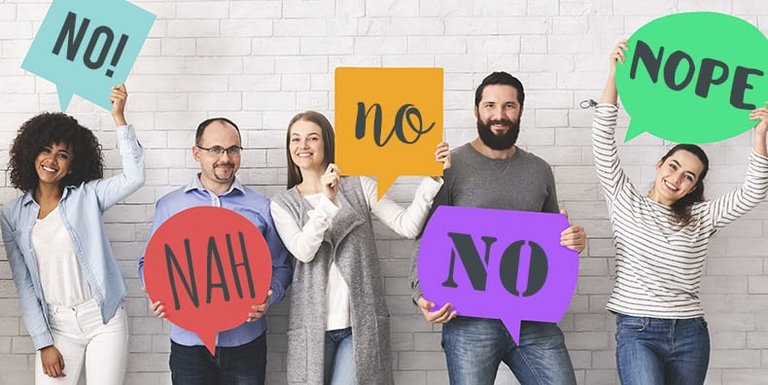Learning to say "no" is a valuable skill that can help you take control of your time and energy, and protect yourself from burnout and stress. However, it can be difficult to put into practice, especially if you're someone who tends to put others' needs before your own. If you're struggling to develop the habit of saying "no," here are a few small steps you can take to make it a bit easier.
Start small
One of the biggest reasons why people struggle to say "no" is that they worry about the consequences of doing so. They fear that saying "no" will disappoint or anger someone, or that it will negatively impact their relationships or professional opportunities. To help ease these fears, start by saying "no" to small requests. For example, if someone asks you to grab lunch together but you're swamped with work, you might say "I'm sorry, I can't today, but I'd love to catch up another time." By practicing saying no to small requests you can train yourself to become comfortable with this concept, and your self-confidence will grow.
Be honest and direct
When you do say "no," it's important to be honest and direct. Don't make excuses or beat around the bush. Just say "I'm sorry, I can't" or "I can't commit to that right now." Being honest and direct will help the other person understand that you're not just trying to brush them off, and it will also help you to avoid feeling guilty or resentful later on.
Offer an alternative
Another way to make it easier to say "no" is to offer an alternative. For example, if someone asks you to work late but you already have plans, you might say "I can't work late tonight, but I can come in early tomorrow to get the work done." Or if someone asks you to volunteer for a committee but you're already stretched thin, you might suggest that you'll be happy to help out in another way. Offering an alternative will show that you're still willing to help out and that you value the request, but also it will give you some room to decline in certain aspects.
Set boundaries
Saying "no" is a lot easier if you have clear boundaries in place. These boundaries can include things like not answering work emails after a certain time, not taking on more than a certain number of projects at once, or not agreeing to meet with people outside of specific hours. When you have clear boundaries, you can easily say "no" when someone asks you to do something that falls outside of them.
Practice self-care
One of the reasons that people struggle to say "no" is that they don't take care of themselves. They're always running on empty, and they feel like they can't afford to turn down any opportunities. To help yourself build the habit of saying "no," take steps to practice self-care. Make sure you're getting enough sleep, eating well, and exercising. Take time for hobbies or other activities that you enjoy. By taking care of yourself, you'll be in a better position to set boundaries and say "no" when you need to.
Learning to say "no" is a process and it won't happen overnight. But by starting small, being honest and direct, offering alternatives, setting boundaries, and practicing self-care, you can develop the habit of saying "no" and take control of your time and energy. As you become more comfortable with the process, you'll start to realize that it's not only a necessary skill but also a powerful one, and it will help you to achieve a better balance in your life.
It's also important to remember that saying "no" doesn't make you a bad person or a poor friend/colleague. Everyone has their own limitations and responsibilities, and it's important to honor those. Saying "no" to certain things will allow you to say "yes" to the things that are truly important to you. It can also help you to avoid burnout and build healthier relationships with those around you, as you'll be able to give your full attention and energy to the things that truly matter.
Another benefit of saying "no" is that it can help you to focus on your priorities and set goals for yourself. When you're constantly saying "yes" to everything, it can be hard to figure out what you really want and what you should be working towards. By saying "no" to some things, you'll be able to gain a better understanding of what you're passionate about and what you want to achieve in the long-term.
Learning to say "no" is a valuable skill that can help you take control of your time and energy, and protect yourself from burnout and stress. Start small, be honest and direct, offer alternatives, set boundaries and practice self-care, you will gradually find it easier to say "no" when it's necessary. It's important to remember that it's not a negative thing and that by saying "no" to certain things, you'll be able to give your full attention and energy to the things that truly matter to you.
